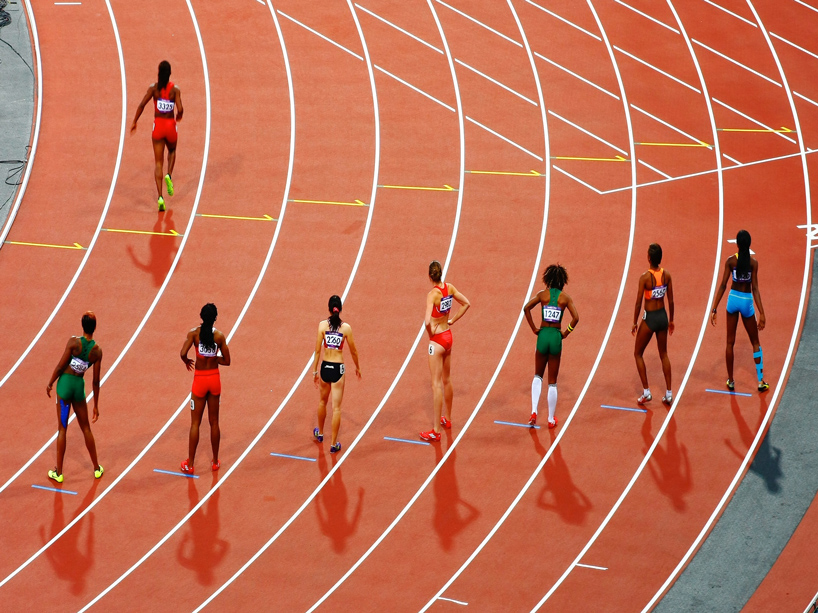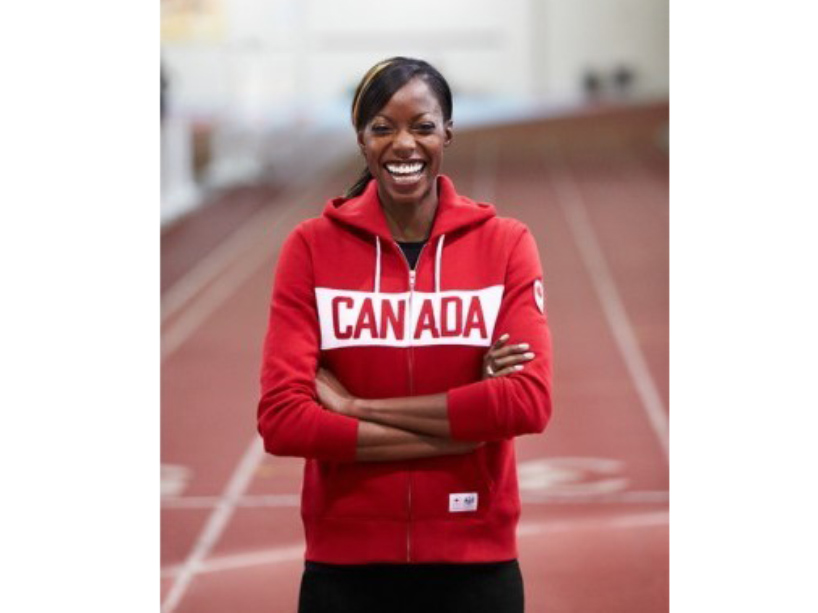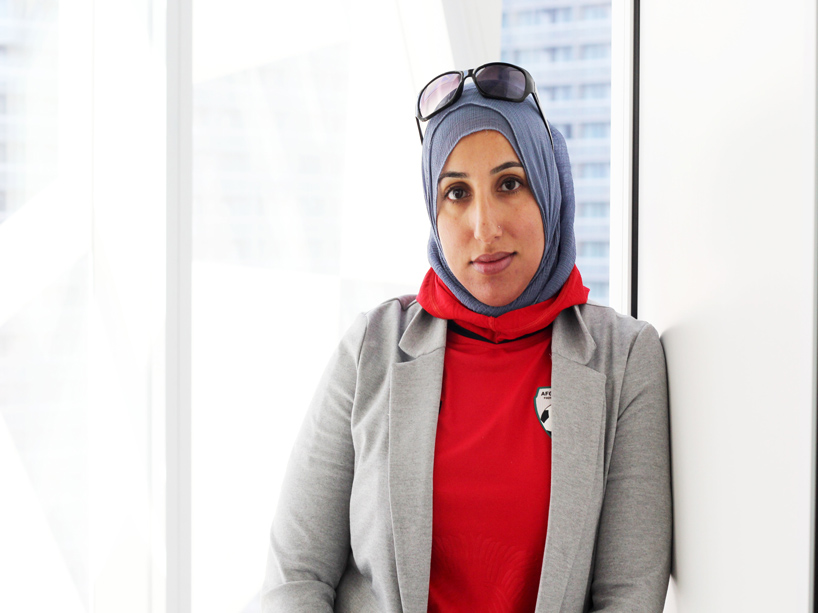Fighting for a fair playing field

From speaking out about uniform accommodations for female athletes, to the underrepresentation of women and other racialized individuals in sports media, educators Nicole Forrester, Shireen Ahmed and Laurel Walzak are battling for gender equity in sport. (Matt Lee/Unsplash)
For years, women and racialized people in sport have been fighting a battle far beyond the field, rink or court.
Discrimination, sexism, misogyny, sexual harassment, sexual assault and other human rights violations have long been a barrier to their ability to succeed - whether as an athlete, a coach, a referee or those in related fields - from team management staff to sports media professionals.
Three educators at Toronto Metropolitan University are fighting to change that.
Armed with research, resilience, knowledge, lived experience in the systems of power they oppose, along with the courage to stand up and speak out, they are leading a charge for change.
The powerhouse lineup includes Olympian Nicole Forrester, an eight-time Canadian national track and field champion, mental performance consultant and TMU sports media assistant professor in The Creative School; Shireen Ahmed, award-winning sports activist, TMU graduate (master’s in media production) and RTA sports journalism instructor; and Laurel Walzak, sports media and sports business expert, director of the GXSLab (external link) and professor at The Creative School.
Below, see how these leaders are turning heads, demanding change and making a difference.

Through her work with the Women’s Sports Federation, TMU professor Nicole Forrester is providing recommendations on gender equality for the International Olympic Committee and International Paralympic Committee. (Photo courtesy of Nicole Forrester)
Canadian Olympian and TMU Sports Media professor Nicole Forrester remembers the moment well.
She was sitting in a sports management class at the University of Michigan when she first learned about Title IX (external link) .
The American civil rights law was enacted as part of the Education Amendments of 1972. As a result of its stipulations, universities and colleges investing in sport began providing gender equity for student athletes.
“It had the most powerful impact on sport,” Forrester said.
“It meant that if you had a varsity team for men, you had to have one for women, and there had to be the opportunity for as many men participating in varsity as there were for women,” she explained.
“But, it also meant that the experiences had to be equal - so if you’re competing out of town, the accommodation you have, how you travel, what varsity jacket you wear - women had to have the same,” she continued, noting that the bill had a ripple effect around the world, including in Canada, and that we continue to see its impact today.
“I know I am only where I am now because of Title IX,” she said.
McDonald’s discovery
Forrester’s start in track and field, however, was an unusual one - and a leap she almost didn’t take.
A self-described “latchkey kid” from an immigrant family, unlike many of her former teammates, she didn’t grow up in sport at all.
When she was 17, she was working at a McDonald’s when a coach spotted the six-foot-three teen and said her long legs were made for track and field - high jump specifically.
“I wasn’t even supposed to be working that day,” she said.
Next thing she knew, she was hitting the podium at local track meets - and a few months later, an athletic scholarship came her way.
Today, she’s an Olympian (2008 Beijing Games), an eight-time Canadian national champion, a Canadian record holder and medalist in multiple other events, including the Commonwealth Games.
But she knows not everyone is fortunate enough to have the chance to be in sport - and it’s part of what drives her today.
“My compass is the millions of other kids who might not have that opportunity, but could be an athlete,” she said. “I want to remove the barriers they face.”
Impact in classroom and beyond
As part of her mission, Forrester teaches students at TMU about how social class, race, gender and sexuality intersect with sport. She also teaches about politics, activism and sport, and recently launched a new course, The Athlete’s Perspective.
Beyond the classroom, Forrester works across several boards, committees, and sports organizations including the Canadian Olympic Committee, Commonwealth Games Federation, the Greater Toronto Hockey League (GTHL) and the Women's Sports Foundation (external link) (WSF), founded by tennis legend Billie Jean King, known worldwide for her role in securing equal prize money for men and women.
Forrester is currently supporting the WSF by providing recommendations for the International Olympic Committee, International Paralympic Committee, International Sports Federations, and the U.S. Olympic and Paralympic Committee on gender equality as it relates to the participation, leadership and media of the 2022 Beijing Olympic Games.
“I’m always looking for, ‘How can we do better?’ ‘How is the sport structured?’ How are decisions made and by who?’” she said.
For the GTHL, as a member of the Independent Committee, Forrester provided a Roadmap for Change report and list of recommendations, which are currently underway. They include creating and implementing a Black, Indigenous, and people of colour Coaching Mentorship program, and recruiting, training and providing opportunities for women in the GTHL.
‘It’s the right thing to do’
She says safety in sport is another crucial area to address.
“What’s happening with Hockey Canada - we’re just scratching the surface,” she said, referring to the sexual assault scandal that recently surfaced, and noting that other national sport organizations, including Gymnastics Canada, are embroiled in similar cases of abuse and maltreatment.
She notes that females and racialized athletes are more likely to be victimized, since “they’re seen as weaker and less likely to challenge authority - there is a perceived power imbalance.”
With so many challenges and work ahead, what pushes Forrester to keep going?
“It’s the right thing to do,” she said. “I go back to Title IX, and the work of many people like Billie Jean King. You continue to build so that those after you can do even better.”

Shireen Ahmed is an award-winning sports activist who focuses on the intersections of racism and misogyny in sports. (Photo: Erica Ngao)
Growing up fighting for her rights as a veiled, Muslim female in sport, sports media instructor Shireen Ahmed has devoted much of her life advocating for an equal playing field for all.
From pushing for uniform accommodations to the inclusion of trans athletes, Ahmed has been calling attention to issues of unfair treatment in sport - both on and off the court.
Ahmed first took to the airwaves on a podcast she launched from her home called Burn it All Down (external link) - which has been praised by The Athletic and The Guardian.
Her work has also been featured and discussed in Sports Illustrated, espnW, TSN, Huffington Post, The Establishment, Vice Sports, Today's Parent, Best Health Magazine, Chatelaine, Edge of Sports Radio and more.
“Systems of inequality stem from things that we don't always think about. For instance, when we look at equity, what does that look like not only in terms of pay equity, but the representation of women and visible minorities who are the referees? Have we talked about the representation of front office staff? Who are the editors? The producers? Who are the team owners? Because change cannot be put into effect if the decision makers aren’t affected by it,” she said.
Today, Ahmed’s voice is reaching far beyond her podcast. She writes weekly columns for CBC Sports, appears regularly on various newscasts - she was the first Muslim woman in a headscarf to be on Sports Centre - and more.
She also shares her work with her students at TMU, inspiring future journalists to think critically and confront issues of inequality in the stories they tell.
“To be teaching this at the best school of journalism in the country is really important… I’m always encouraging students to look at different angles. Did you examine that? Did you think about this possibility?”
It’s crucial to teach this, she says, since so much work still needs to be done - including increasing representation in the media itself.
“We still don’t have a full-time Indigenous sports writer in this country,” she said, adding that there isn’t a full-time transgender sports writer either.
And while she acknowledges that non-racialized, CIS journalists are able to report on race, “The industry is still being dominated by those who don't actually suffer from those systems of oppression. And that concerns me,” she said.
‘Forcing women to uncover is a problem’
Still, there are signs of hope. In 2020, when the Norwegian women’s beach handball team was banned from wearing shorts and ordered to wear bikini bottoms - “the world erupted” - and Ahmed’s expertise was in such demand, even NBC came calling.
“I was like, ‘Hey, folks, I've been yelling about this for a decade. Forcing women to uncover is a problem. And forcing women to uncover is as violent as forcing them to cover,’” she said.

In the wake of the recent sexual assault scandal involving Hockey Canada, TMU professor Laurel Walzak recently signed an Open Letter to the organization demanding accountability. (Photo courtesy of Laurel Walzak)
Recently, TMU professor Laurel Walzak put her signature on a significant document in the Canadian sports world.
Following revelations that Hockey Canada covered up sexual assault allegations involving players with the 2003 and 2018 world junior teams, combined with systemic and deeply rooted issues of misogyny, sexism and racism within the league, 28 professors from 21 Canadian universities - including Walzak - submitted an open letter to Hockey Canada (external link) and the Canadian government demanding accountability from those in positions of power within the sports industry.
For Walzak, signing the letter was a longtime coming.
“We have been saying this for years - documenting it, researching it and disseminating knowledge on this - so to finally have attention on it - it’s fantastic,” she said, noting that sport media professor Joseph Recupero added his name to the letter as well.
The letter is a call-to-action for Hockey Canada to address sexual assault in Canadian men's ice hockey and create systemic change throughout the industry.
“We have to tear it down from the top and build it back up. This needs to be deinstitutionalized,” Walzak said.
It’s important the academic community is involved “because we understand the systemic challenges and how to have an impact.”
“There’s a phenomenal amount of work that’s been done on sport governance, sexual assault, and boards and the male-dominated power structure. Let’s share our research and what participants have been sharing with us,” she continued.
Another advantage of involving academics? They’re impartial.
“Politically, we have no stake in this. If you’re in the industry, you’re fearful for your job. This freedom of speech allows us to have more transparent conversations that can invoke change,” she said.
‘They’re protecting one another’
The committee also demands Hockey Canada CEO Scott Smith step down immediately.
“He was complicit,” Walzak said, adding that the board of directors, too, “let this happen under their watch.”
In fact, national sport organizations across the country need to be reviewed for conflicts of interest and training, she continues.
“These board members - many don’t have training on what corporate governance is. Many have conflicts of interest and have gotten away with it,” she said, noting that hockey has long been a problem since the core of its power structure lies with a select few individuals.
“It’s small and it’s male and they’re protecting one another,” she said, noting that that’s what inspired the name of her upcoming book, Hockey Mafia, which will be released in the fall of 2023.
With so many issues to address, she says she and her peers are prepared for a fierce battle.
“We are not going to let it go. We're in this for the long run.”
–
Related
